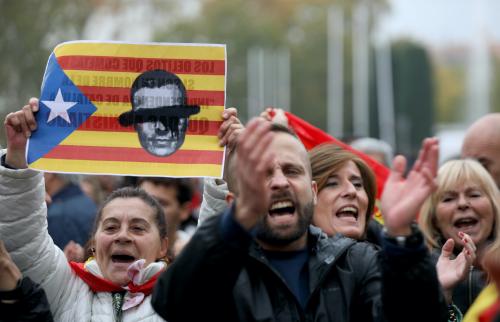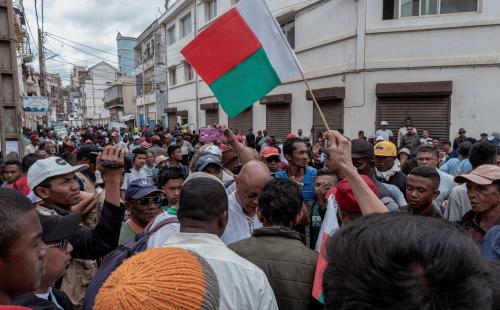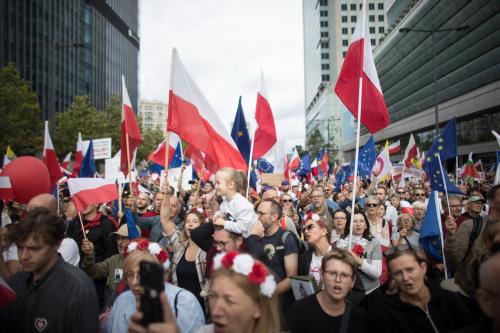On Sunday, November 19, Argentines cast their votes for president in the aftermath of a globally watched campaign. Argentina’s election pit establishment candidate Sergio Massa, a Peronist figure active in politics since 1989, against insurgent candidate Javier Milei, a self-described “anarcho-capitalist” newer to the political sphere. During the campaign, attention often focused on Milei’s surprising success, outlandish persona, and political gimmicks.
However, a dire economic situation and anger toward political elites played a critical role in shaping each campaign and fueling Milei’s rise. With frustration boiling over, Milei received the highest number of votes for any candidate in Argentine history, beating Massa in the second round by nearly 12 points.
A crisis foretold
In many ways, the results of the presidential election are unsurprising. Across Latin America, the pro-incumbent political force has won just one of the past 18 democratic elections. And in democracies, economic conditions are among the most important in determining the outcome of an election. Argentina’s economy has been unstable for decades, with economic growth stagnant, 40% of the population living below the poverty line, and soaring inflation.
Unsurprisingly, Argentine voters have become less and less satisfied with the economy over time, making the election ripe for repudiation of the establishment candidate (Figure 1). To add to this challenge, over the past year, the political leader attempting to right the country’s course was Massa, who served as the minister of economy in the cabinet of Argentina’s deeply unpopular incumbent, President Alberto Fernández.
As if the headwinds were not already daunting, voter confidence in the presidency had also consistently declined over the past two decades (Figure 2). During this period, a Peronist figure in some form has helmed the federal government for all but four years, when center-right businessman Mauricio Macri held the office. As a result, Massa’s attempt to project moderation in the face of such visceral disappointment failed to gain enough traction, as he struggled to distance himself from a movement with which he was so intertwined throughout his political career.
For at least some Argentines, a vote for Milei was less about the candidate or his policies and more about rejecting a status quo and political establishment that they felt would lead to more of the same frustration. Instead, they chose to dive headfirst into the unknown, opting for the mercurial Milei, nicknamed “El Loco” (“The Madman”), and his untested “shock therapy” approach.
What can we expect from Milei?
It’s unclear which Milei will show up to the Casa Rosada come December of this year. During the campaign, Milei called climate change “a lie of socialism,” equated abortion to “murder,” and downplayed violence during Argentina’s military dictatorship as “excesses,” among other controversial statements.
Yet, prior to the second round of voting, Milei was forced to moderate his more outlandish behavior — including losing a chainsaw as a campaign accessory — in order to lure voters and endorsements from a conservative political class whom he had previously referred to as part of the “parasitic, stupid, and useless political caste.” He failed to persuade everyone but forged ties with the third-place conservative candidate, Patricia Bullrich, and Macri, the former president, whose endorsements helped him surpass Massa in the final vote tally.
Despite a somewhat tempered style since his election victory, there are several notable policy positions where Milei has remained firm. His biggest campaign promises pertain to the economy and public spending, where he has pledged to cut the government budget by 14% of Argentina’s GDP. To accomplish this lofty objective, he plans to privatize public enterprises, including the media, consolidate government ministries, and cut back on subsidies for utilities, such as electricity, among other changes.
Milei has also vowed to “dollarize” the Argentine economy, eliminating the peso in favor of the U.S. dollar. Critics have called the move a blow to national sovereignty that would eliminate the ability of the Argentine government to maneuver in times of crisis. Yet Milei lacks a mandate in Congress, and some of these signature proposals will require legislative approval to enact. As a result, the president-elect will likely have to compromise or put eligible proposals up for a popular vote.
Milei on the world stage
Milei’s bombastic rhetoric will likely also have a tangible impact internationally, where he will be less hamstrung by divisions in Congress but instead beholden to historic ties vital to turning around an already dismal economic situation. The president-elect has voiced a dogmatic disdain for the Chinese government, threatening to halt “trade with an assassin” during the campaign. And with the regional heavyweight to the north, Brazil, relations have already soured. Brazilian President Luiz Inácio Lula da Silva congratulated “Argentinian institutions” and “the Argentinian people” on a successful election, but did not mention Milei by name; in the past, Milei referred to Lula as a “crook” and a “Communist.”
Brazil and China are the top destinations of Argentine exports, and despite this rhetoric, Milei’s team has indicated at least some recognition of the importance of these ties. Regardless of what Milei does, provinces in Argentina can also forge their own ties directly, as was the case when the governor of Jujuy province signed an agreement with China’s Tsingshan Mining Development S.A. to spur the production of lithium carbonate. Whether a more tempered Milei — or an emboldened one — appears on the world stage will also likely be shaped by what happens in the 2024 U.S. elections.
Lessons for future elections
Beyond questions about the viability of his political agenda, Argentina’s elections have again spotlighted two worrying trends. The first is the continued willingness of candidates to undermine democratic norms. Much like leadership in Brazil and the United States, Argentina’s president-elect sought to cast doubt on the electoral process throughout the campaign. Just days before the second round of elections, Milei’s campaign surrogates accused the police of stuffing ballots in support of Massa, a claim that echoed earlier criticism that he had been robbed of votes in the August primaries too. In each of these cases, they lacked evidence to corroborate their claims.
With a resounding victory, Milei and his team back-peddled on allegations of fraud, claiming the elections “were transparent.” It is clear, however, that these types of accusations may resurface down the road, and it should not be surprising if this becomes a global trend. Around the world, voters and political leaders gambling on change at the ballot box must still guard their democratic processes against these illiberal tendencies.
The use of generative AI during elections
The second area of concern pertains to the use of artificial intelligence. Much commentary has focused on the potential for generated images, videos, and text to upend democratic elections by turbocharging the production of fabricated information. In the absence of such sweeping campaigns thus far, some have dismissed their potential transformative impact already. These tools will undoubtedly contribute to bizarre photos and video montages akin to those produced by the Massa campaign, but they may also shape the election cycle moving forward in other important ways.
We saw glimmers of this in Argentina, where the mere possibility of deepfakes and other generated content allowed politicians to dismiss potentially true scandals as fabrications — a phenomenon known as the “liar’s dividend.” While it is still unclear what happened during the campaign, Bullrich, the third-place candidate, repudiated leaked audio in which one of her economic advisors allegedly offered jobs in return for sexual favors as AI generated and part of a “dirty campaign,” potentially denting the recording’s impact among voters.
This is not the first time or the only way that generative AI has played a meaningful role in an election. In Slovakia’s elections in late September, a deepfake audio purported to show a political leader and a journalist discussing how to rig an election just two days before voters were heading to the polls. These “October surprises” are notoriously difficult for the media to investigate and widely debunk. To address these challenges, it will be critical to develop safeguards and expand education efforts tied to the use of generative AI during elections.
In 2024, 40 countries will hold national-level elections. Collectively, they will decide who governs 41% of the world’s population and 42% of global GDP. With Argentina as an early example, the stakes are too high to ignore these emerging trends.
The Brookings Institution is committed to quality, independence, and impact.
We are supported by a diverse array of funders. In line with our values and policies, each Brookings publication represents the sole views of its author(s).








Commentary
Argentina dives into the unknown with lessons for future elections
November 22, 2023